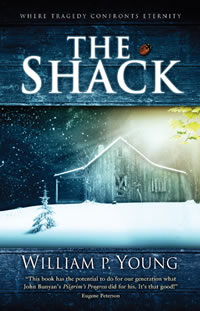Book Notes
 Wm. Paul Young, in collaboration with Wayne Jacobsen and Brad Cummings, The Shack; Where Tragedy Confronts Eternity (Los Angeles: Windblown Media, 2007), 248pp.
Wm. Paul Young, in collaboration with Wayne Jacobsen and Brad Cummings, The Shack; Where Tragedy Confronts Eternity (Los Angeles: Windblown Media, 2007), 248pp.
Paul Young's prose might not compare favorably with John Updike's. His theology might pale next to John Calvin. But he's a wise enough man never to make such a claim and, what's more, not even to care. He's written a book that has deeply touched millions of readers. I read The Shack as much for the author's personal story as for his fictional novel.
Paul Young (b. 1955) epitomizes the accidental author. He had always written stories, songs, and poems for his family and friends, but never published anything. He never intended to publish anything, and least of all did he have any intentions of publishing The Shack. He wrote the book in four months while riding a commuter train to work. As was his custom, he printed fifteen copies at the local Kinko's for friends. They urged him to publish it.
Rejected by twenty-six publishers, Young and two friends (former pastors) borrowed $15,000 and created Windblown Media. They published their one and only title in May 2007 and sold 11,000 copies out of their garage in four months. A year later Hachette Book Group USA, a large mainstream publisher, partnered with Windblown. According to Nielsen, The Shack was the top-selling fiction and audio book in America in 2008. Today there are 5.5 million copies in print, with plans for translations into thirty-five languages and rumbles about a movie version.
On his website (http://www.windrumors.com/bio/), Young describes being born in Alberta, Canada, then living with his missionary parents in "the highlands of Netherlands New Guinea (West Papua), among the Dani, a technologically stone age tribal people. These became my family and as the first white child and outsider who ever spoke their language." Boarding school began when he was six, and by the time he graduated he had attended thirteen schools. He graduated from Warner Pacific College in Portland, Oregon, bounced around in a variety of odd jobs, and describes himself as "a very simple guy; I have one wife, six kids, two daughter-in-laws and two grandkids on the way. I work as a general manager, janitor and inside sales guy for a friend who owns a small manufacturers rep company in Milwaukie, Oregon, and I live in a small rented house in Gresham, Oregon." Sexual abuse as a child and then a brief affair as an adult provoked a life crisis at age thirty-eight. Fifteen years later, says Young, he has finally learned to trust the lavish love of God.
The "shack" in Young's novel was the place of a horrible family tragedy. More broadly, it's a metaphor for your place of shame, the "icon of your deepest pain" (65), "the place of your nightmares" (69) or "center of your pain" (74). In an interview he describes the shack as "the place we build to hide all our crap." The novel begins with a mysterious note from God who invites Mack, the main character, back to the shack. And so the shack is also a place of healing, for God meets us in "the middle of our mess." Indeed, the shack is located near a town called Joseph, which name evokes Genesis 50:20, "You meant it for evil, but God intended it for good."
What Young has written is really a doctrine of God as it relates to the problem of evil, only in story form. His literary devices have earned him the ire of many gatekeepers. The trinitarian God who welcomes him back to the shack is El-ousia, "a large beaming African-American woman" (Father), a "small, distinctively Asian woman" named Sarayu who collects tears (the Spirit), and a Middle Eastern man dressed like a laborer (Jesus).
Mack discovers that God is not like he thought. He's not the product of his projections or the neat formulas of religion. He is perfectly good. He intends to heal and not humiliate us. Mack learns to trust him fully and believe that He is near, regardless of his emotions. Institutional religion in particular, with its hierarchies and authoritarianism, along with politics and economics, are "the trinity of terrors that ravages the earth." In this formulation, reconciling relationships are far more important than religious rules. And true to his story, in real life Young does not attend or belong to any religious organization. The Shack isn't great literature, but it's worth reading as a fresh take on what Christians claim is good news.


